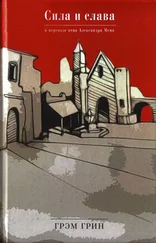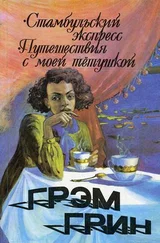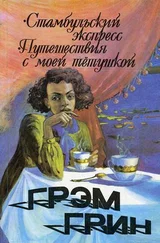Грэм Грин - The Comedians
Здесь есть возможность читать онлайн «Грэм Грин - The Comedians» весь текст электронной книги совершенно бесплатно (целиком полную версию без сокращений). В некоторых случаях можно слушать аудио, скачать через торрент в формате fb2 и присутствует краткое содержание. Год выпуска: 1966, Жанр: Классическая проза, на английском языке. Описание произведения, (предисловие) а так же отзывы посетителей доступны на портале библиотеки ЛибКат.
- Название:The Comedians
- Автор:
- Жанр:
- Год:1966
- ISBN:нет данных
- Рейтинг книги:3 / 5. Голосов: 1
-
Избранное:Добавить в избранное
- Отзывы:
-
Ваша оценка:
- 60
- 1
- 2
- 3
- 4
- 5
The Comedians: краткое содержание, описание и аннотация
Предлагаем к чтению аннотацию, описание, краткое содержание или предисловие (зависит от того, что написал сам автор книги «The Comedians»). Если вы не нашли необходимую информацию о книге — напишите в комментариях, мы постараемся отыскать её.
The Comedians — читать онлайн бесплатно полную книгу (весь текст) целиком
Ниже представлен текст книги, разбитый по страницам. Система сохранения места последней прочитанной страницы, позволяет с удобством читать онлайн бесплатно книгу «The Comedians», без необходимости каждый раз заново искать на чём Вы остановились. Поставьте закладку, и сможете в любой момент перейти на страницу, на которой закончили чтение.
Интервал:
Закладка:
'No. It's where they kill cocks.'
His mouth twitched, but he put the pain away from him: to feel pain was a kind of criticism. He said, 'I don't see many folk around here.'
The Secretary for Social Welfare said proudly, 'There were several hundred on this very spot. Living in miserable mud huts. We had to clear the ground. It was quite a major operation.'
'Where did they go?'
'I suppose some went into town. Some into the hills. To relatives.'
'Will they come back when the city's built?'
'Oh well, you know, we are planning for a better class of people here.'
Beyond the cockpit there were four houses built with tilted wings like wrecked butterflies; they resembled some of the houses of Brasilia seen through the wrong end of a telescope.
'And who will live in these?' Mr Smith asked.
'These are for tourists.'
'Tourists?' Mr Smith asked.
Even the sea had receded out of sight; there was nothing anywhere but the great cockpit, the cement field, the dust, the road, and the stony hillside. Outside one of the white boxes a negro with white hair sat on a hard chair under a sign that showed him to be a justice of the peace. He was the only human being in sight — he must have had a lot of influence to be installed so soon. There was no sign of men working, though a bulldozer stood on the cement playground with one wheel detached.
'The visitors who come to see Duvalierville.' He led us nearer to one of the houses: it was no different from the other boxes except for the useless wings which I could imagine dropping off in the hard rains. 'Now one of these — they are designed by our finest architect — might do for your centre. You wouldn't have to begin then on a bare site.'
'I had thought of something larger.'
'You could take over the whole group.'
'What would happen to your tourists then?' I asked.
'We would build some more over there,' he said, waving his hand at the dry insignificant plain.
'It seems a bit out of the world,' Mr Smith said gently.
'We are going to house five thousand people here. For a start.'
'Where will they work?'
'We shall bring industries to them. The Government believes in decentralization.'
'And the cathedral?'
'It will be over there, beyond the bulldozer.'
Around the corner of the great cockpit came seesawing one other human being. The justice of the peace was not after all the sole inhabitant of the new city. It already had its beggar too. He must have been sleeping in the sun, until he was woken by our voices. Perhaps he thought that the architect's dream had come true and there really were tourists in Duvalierville. He had very long arms and no legs and he moved imperceptibly nearer like a rocking-horse. Then he saw our driver and his dark glasses and his gun, and he stopped. Instead he set up a crooning murmur, and from under his torn cobweb of a shirt he drew a small wooden statuette which he held out towards us.
I said, 'You have your beggars then.'
'He is no beggar,' the Minister explained, 'he is an artist.'
He spoke to the Tonton Macoute who went and fetched the statuette; it was the figure of a half-naked girl indistinguishable from dozens in the Syrian stores that waited for gullible tourists who never came now.
'Let me make you a present,' the Minister said, handing the statuette to Mr Smith who took it with embarrassment. 'An example of Haitian art.'
'I must pay the man,' Mr Smith said.
'No need. The Government looks after him.' The Minister began to lead the way back to the car, his hand on Mr Smith's elbow to guide him over the broken ground. The beggar rocked to and fro, making sounds of melancholy and desperation. No words were distinguishable; I think he had no roof to his mouth.
'What is he saying?' Mr Smith asked.
The Minister ignored the question, 'Later,' he said, 'we will have a proper art centre here where the artists can live and relax and get their inspiration from nature. Haitian art is famous. Our pictures are collected by many Americans, and there are examples in the Museum of Modern Art in New York
Mr Smith said, 'I don't care what you say. I'm going to pay that man.' He shook off the protecting hand of the Secretary for Social Welfare and ran back towards the cripple. He pulled out a bunch of dollar bills and held them out. The cripple looked at him with incredulity and fear. Our driver made a motion to interfere, but I blocked his way. Mr Smith bent down and pressed the money into the cripple's hand. The cripple with an enormous effort began to rock back towards the cockpit. Perhaps he had a hole there in which he could hide the money … There was an expression of rage and disgust on the driver's face as though he had been robbed. I think he contemplated drawing his gun (his fingers went to his belt) and putting an end to at least one artist, but Mr Smith was coming back along his line of fire. 'He's made a sale all right,' Mr Smith said with a satisfied smile.
The justice of the peace had risen to watch the transaction outside his box beyond the playground — standing he was an enormous man. He put his hand over his eyes to see better in the hard sunlight. We took our places in the car, and there was a momentary silence. Then the Secretary said, 'Where would you like to go now?'
'Home,' said Mr Smith laconically.
'I could show you the site we have chosen for the college.
'I've seen enough,' Mr Smith said. 'I'd rather go home if you don't mind.'
I looked back. The justice of the peace was running fast on long loping legs across the cement playground, and the cripple was rocking back with desperation towards the cockpit; he reminded me of a sand-crab scuttling to its hole. He had only another twenty yards to go, but he hadn't a chance. When I looked round a minute later Duvalierville was hidden by the dust-cloud of our car. I said nothing to Mr Smith, for he was smiling happily at a good action accomplished; I think he was already rehearsing the story he would tell to Mrs Smith, a story which would enable her to share his sense of happiness.
After we had gone a few miles the Minister said, 'Of course the tourist site is partly the responsibility of the Secretary for Public Works, and the Secretary for Tourism would also have to be consulted, but he is a personal friend of mine. If you cared to make the necessary arrangements with me, I would see that the others were satisfied.'
'Satisfied?' Mr Smith asked. He was not wholly guileless; though he had been unshaken by the beggars in the Post Office, I believe the city of Duvalierville had opened his eyes.
'I mean,' the Minister said — he produced a box of cigars from the back of the car, 'you will not want to be involved in endless discussions. I will represent your views to my colleagues. Take a couple of cigars, Professor.'
'No, thank you. I don't smoke.' The driver did. He saw what was going on in his mirror, and leaning back he abstracted two cigars. One he lit and one he put in his shirt-pocket.
'My views?' Mr Smith said. 'If you want them, you shall have them. I don't see your Duvalierville being exactly a centre of progress. It's too remote.'
'You would prefer a site in the capital?'
'I'm beginning to reconsider the whole project,' Mr Smith said in a voice so final that even the Minister relapsed into uneasy silence.
4
And yet Mr Smith lingered on. Perhaps when he went over the events of the day with Mrs Smith, the aid he had given the cripple re-established his sense of hope, hope that he could do something for the human race. Perhaps she strengthened his faith and fought his doubts (she was more a fighter than he). Already by the time we arrived at the Hotel Trianon, after more than an hour of gloomy silence, he had begun to revise his severest criticisms. The thought that he might possibly have been unfair haunted him. He had said good-bye with distant courtesy to the Secretary for Social Welfare and thanked him 'for a very interesting excursion', but suddenly on the steps of the verandah he halted and turned to me. He said, 'That word "satisfied" — I guess I took him up too hard. It made me sore, but then English isn't his native tongue. Maybe he didn't intend …'
Читать дальшеИнтервал:
Закладка:
Похожие книги на «The Comedians»
Представляем Вашему вниманию похожие книги на «The Comedians» списком для выбора. Мы отобрали схожую по названию и смыслу литературу в надежде предоставить читателям больше вариантов отыскать новые, интересные, ещё непрочитанные произведения.
Обсуждение, отзывы о книге «The Comedians» и просто собственные мнения читателей. Оставьте ваши комментарии, напишите, что Вы думаете о произведении, его смысле или главных героях. Укажите что конкретно понравилось, а что нет, и почему Вы так считаете.



